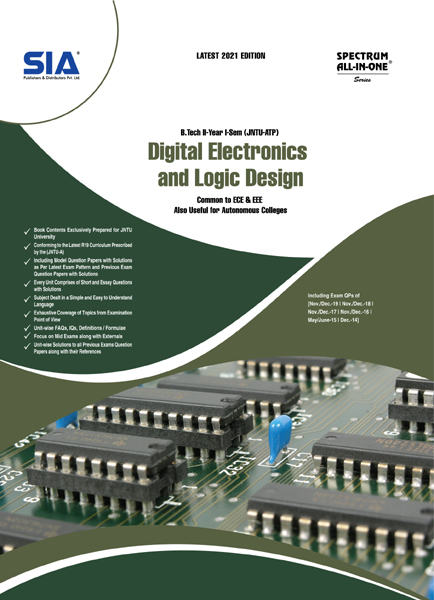

Note: Please check your Spam or Junk folder, in case you didn't receive the email with verification code.
Syllabus
Unit-1
Number Systems and Codes: Decimal, Binary, Octal, and Hexa-decimal number systems and their conversions, ASCII code, Excess -3 codes, Gray code. Binary codes Classification, Error detection and correction – Parity generators and checkers – Fixed point and floating-point arithmetic. Boolean Algebra& Logic Gates: Boolean operations, Boolean functions, Algebraic manipulations, Minterms and Maxterms, Sum-of-products and Product-of-sum representations, Two-input logic gates, NAND /NOR implementations. Minimization of Boolean Functions: Karnaugh map, Don’t-care conditions, Prime implicants, Minimization of functions using Quine-McClusky method.
Unit-2
Combinational Circuits: Introduction, Analysis of combinational circuits, Design Procedure– Binary Adder-Subtractor, Decimal Adder, Multiplier, Comparator, Code Converters, Encoders, Decoders, Multiplexers, Demultiplexers, Illustrative examples. Sequential Circuits-1: Introduction, Latches –RS latch and JK latch, Flip-flops-RS, JK, T and D flip flops, Masterslave flip flops, Edge-triggered flip-flops, Flip-flop conversions.
Unit-3
Sequential Circuits-2: Analysis and Design of Synchronous Sequential Circuits: Moore and Mealy machine models, State Equations, State Table, State diagram, State reduction & assignment, Synthesis using flip flops, Elements of Design style, Top–down design, Algorithmic state Machines (ASM), ASM chart notations. Registers and Counters: Registers, shift registers, Ripple counters, Synchronous counters, Modulus-n Counter, Ring counter, Johnson counter, Up-Down counter.
Unit- 4
Memory and Programmable Logic: RAM, Types of Memories, Memory decoding, ROM, Types of ROM, Programmable Logic Devices (PLDs): Basic concepts, PROM as PLD, Programmable Array Logic (PAL) and Programmable Logic Array (PLA), Design of combinational and sequential circuits using PLDs.
Unit- 5
Digital Logic Families: Unipolar and Bipolar Logic Families, Transistor-Transistor Logic (TTL): Operation of TTL, Current sink logic, TTL with active pull up, TTL with open collector output, Shockley TTL, TTL characteristics, I 2 L, ECL logic Families. CMOS: CMOS Inverter, CMOS characteristics, CMOS configurations - Wired Logic, Open drain outputs, Interfacing: TTL to CMOS and CMOS to TTL, Tristate Logic, Characteristics of Digital ICs: Speed, power dissipation, figure of merit, fan-out, Current and voltage parameters, Noise immunity, operating temperature range, power supply requirements.
 No Preview is available for this book
No Preview is available for this book

 Get 100 instant uPoints on the purchase of Rs.100 or above for each order.
Get 100 instant uPoints on the purchase of Rs.100 or above for each order.
CategoriesEngineering Physics

Format EPUB

TypeeBook